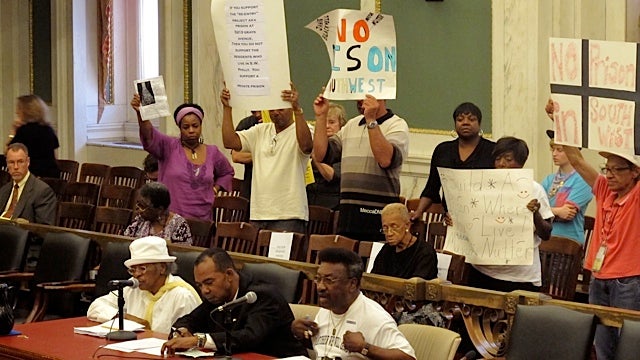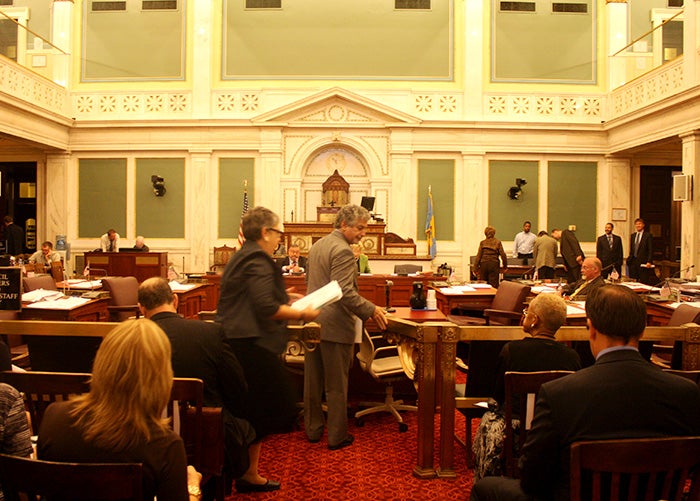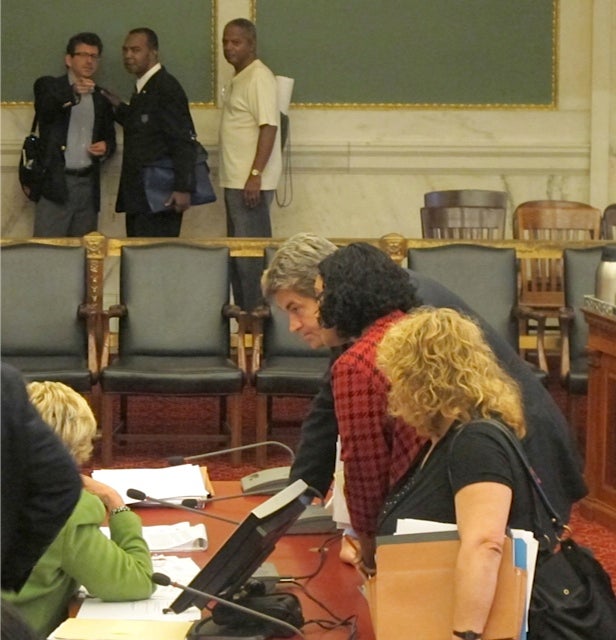Public sessions on zoning proposals are reopened, then closed
In City Council’s last session of public testimony on the zoning code proposals of the Zoning Code Commission Tuesday, about a dozen witnesses on five panels gave about two hours of testimony on zoning reform in Philadelphia. Most spoke in favor of passing a new code before the end of the year, many recommended specific changes to the draft, and some questioned the urgency of enacting a new code before six new members join Council in January.
As was the case during the last Council hearing on the zoning proposals, Deputy Mayor Alan Greenberger and ZCC director Eva Gladstein testified first. Unlike the last hearing, their testimony lasted only a few minutes. Greenberger said that, of the fifteen recommendations the Commission had received from Council, it was ready to fully support nine and partially support three. The Commission’s initial responses to the recommendations were laid out in a document created by the ZCC’s Work Plan Committee and distributed to members of Council.
Among the three recommendations for which the ZCC offered neither full nor partial support:
- Councilman Bill Green’s suggestion to allocate resources to the Planning Commission so that it could complete district remapping in two years, rather than the five currently planned. The ZCC said that the time required to complete such a fine-grained remapping is “highly unpredictable,” and suggested that Council take up the issue with the Planning Commission.
- A recommendation to prohibit any uses that currently require a variance in an industrial district. The ZCC said it had not yet had time to discuss this recommendation.
- Councilman Green’s recommendation to remove methadone clinics from the more general medical use category, and regulate them separately. The ZCC said that this recommendation raised potential legal issues regarding the Americans with Disabilities Act, and suggested that Council consult its attorneys to create proper, legal language for such a provision, or else to address the issue without using the zoning code.
Councilmen Curtis Jones and James Kenney commended the ZCC for its four years’ work, and expressed support for passing the draft. Kenney, who compared the reform process to cleaning out the basement of one’s home, said that the Commission should accept whatever changes to the draft Council suggests, and “pass this thing.”
Fifth District Councilman Darrell Clarke asked Greenberger what Council could do for constituents who have specific complaints once the new code takes effect. Greenberger assured him that Council maintains the right to amend any zoning code in whatever way it sees fit at any time. Council President Anna Verna asked Gladstein about draft provisions on re-entry facilities, or day reporting centers for parolees and pretrial defendants. Gladstein said that the facilities would be allowed by right in the least-restrictive districts under the new code. That issue surfaced again later in the hearing.
The second panel consisted of witnesses Michael Sklaroff of Ballard Spahr and Janet Milkman of the Delaware Valley Green Building Council. Sklaroff testified in favor of updating the administrative procedures of the Philadelphia Historical Commission, which he previously served as chair. He said that the Commission should operate like an official board, with a stenographic record and sworn testimony, and he said that appeals of the Commission’s decisions should go directly to the Court of Common Pleas.
Milkman said that the DVGBC supports the draft proposal in part because of its provisions regarding building efficiency and Transit Oriented Development. “Approving this proposal is the best single step the City could take to make neighborhoods more livable,” Milkman said.
The first witness on the third panel was Sylvia Okechukwu, who testified on behalf of the Logan Community Development Corporation. She said that Logan CDC supports the new code in part because it clarifies the zoning process and formalizes the role of community organizations. “The lack of clear rules in the current zoning code deters small businesses from opening on our neighborhood commercial corridors, homeowners from fixing up their houses and developers from building on vacant land,” Okechukwu said. “The new code tells every developer or homeowner making an improvement to his or her property exactly what is allowed and what is prohibited.”
The next testimony came from Madeline Shikomba of North of Washington Ave. Coalition. Shikomba said that she has “serious reservations” about the draft, and asked for its passage to be delayed. “This document is extremely developer-friendly,” Shikomba said. She said that the draft limits the power of community organizations where it should instead be expanding that power. Echoing a hypothetical concern Councilman Green raised in a memo earlier this month, Shikomba also protested the creation or possible creation of a Philadelphia Parking Authority-owned parking garage in FDR park. Green had suggested that this could be a potential unintended consequence of allowing accessory uses in Parks and Open Spaces (SP-PO Districts). He recommended that the ZCC limit such spaces to recreational uses only. The Commission accepted that recommendation in part, and agreed to prohibit non-accessory parking in SP-PO Districts.
Shikomba is in favor of putting off decisions on zoning reform until after the new Council takes shape, and she characterized the notion that the project will fall apart under a new Council as senseless. “[Zoning reform] was approved by the citizens of Philadelphia,” Shikomba said. “How will it die?”
The final witness on the third panel was Magali Larson, of the Woodland Terrace Homeowners Association. Larson expressed support for the bulk of the draft code, but made one specific suggestion. She said that, under the draft, accessory parking would be allowed within 2,000 feet of the Special Purposes – Institutional (SP-INS) district, while the current code only allows it within 1,000 ft. She recommends that the current controls be kept in place.
The next panel consisted of former ZCC member Andy Toy and Carl Neuber, a resident of River Road. Reading from a prepared statement, Toy urged Council to pass the draft new zoning code prepared by the Commission. “While the new Code is not perfect,” Toy said, “nothing in life is, and if we let that stop us we would get nothing done, which is sometimes the public perception of government.” Toy also reminded Council that it could amend the new code after its passage, “as,” he said, “we’ve done too often with the old Code when we recognize a loophole or unintended consequence.”
Carl Neuber’s testimony dealt solely with his property at 5 ½ River Road. Neuber wants to replace two residences on his property, but has been stymied in doing so because of a ban on new development in his area of River Road. He sought help and advice from Council. Councilman Curtis Jones acknowledged that Neuber’s situation was a “Catch 22.”
The penultimate panel included Majeedah Rashid of Nicetown CDC and Lawrence McEwen of Chestnut Hill Community Association. Rashid informed Council about a handful of projects being developed in Nicetown and said that they should not delay in passing the draft, as it will clarify the zoning process in a way that will benefit her community. McEwen, an attorney, submitted a proposed amendment to Council and the ZCC calling for the formation of “primary registered community organizations.” The amendment reads:
Where a defined neighborhood has a single neighborhood community organization that routinely reviews applications for re-zonings and zoning variances pursuant to an established review procedure, provided that the neighbor community organization registers annually with the Commission, then that neighborhood community organization may apply to the Planning Commission to be recognized and to function as the primary registered community organization in that defined neighborhood …
The amendment would give the primary RCO elevated negotiating power with applicants for zoning variances or special exceptions. ZCC director Gladstein responded by saying that the Commission had elected not to recognize one RCO over another in a given neighborhood, and she characterized that suggestion as “untenable.”
The final panel of Tuesday’s hearing consisted of three Southwest Philadelphia residents accompanied in the audience by about a dozen of their neighbors who held signs protesting the development of a re-entry facility in their neighborhood. The witnesses on the panel were Gregory Moses, James Harris, and Lillian Davis, representing the Southwest Coalition of Community Groups. At issue is draft provision §14-601(4)(i), suggested by Councilwoman Jannie Blackwell, which creates a separate use for Re-Entry Facilities, in order to differentiate them from prisons. The new use would not be a regulated use, and would be permitted by right in the least-restrictive districts. Moreover, designating the use as non-regulated means that there would be no requirement of a 500-ft. buffer between a Re-Entry Facility and a residential district. One such facility is planned for Southwest Philadelphia. The panel requested that the Commission change the provision before passing the new code.
“We want to keep our community as best as we can keep it,” said Lillian Davis, a longtime resident of the neighborhood. She added, “We cannot be comfortable with a prison a few blocks down the road.”
After the last panel’s testimony had ended, just after noon, Council President Verna closed the hearing. City Council now has thirty days to craft a resolution formally sending recommendations back to the Zoning Code Commission. Once that resolution is passed, the ZCC will have another 30 days to submit a Final Report back to Council, which Gladstein has promised to do by mid-November.
Several issues remain unresolved. Councilman Clarke wants clarity from the Commission on whether student housing can be regulated separately from other types of housing. A handful of community groups don’t want to lose their overlay protections. Council members will no doubt hear about more issues from their constituents as the reform process moves forward. But with the close of public hearings Tuesday, Council and the ZCC took one more formal step on the Charter-mandated timeline. Only three formal steps remain: Council’s recommendations to the Commission, the Commission’s Final Report to Council, and Council action on the draft. What compromises are reached in between those steps has yet to be seen.
The Zoning Code Commission will hold its next meeting on Wednesday, October 12th, at 8 a.m.
Contact the reporter at jaredbrey@gmail.com
WHYY is your source for fact-based, in-depth journalism and information. As a nonprofit organization, we rely on financial support from readers like you. Please give today.







